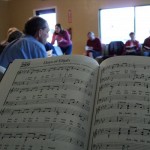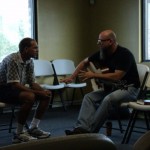The Holy Spirit and the familification of the church
Dave Black is writing a new book about the church. He has tentatively (or maybe permanently) titled it Seven Marks of a New Testament Church.
Over the last few days, he’s shared several excerpts, and they’ve been really good. But the latest except was exceptional (to me) because he also refers to another book that I highly recommend.
Here is that latest excerpt from chapter 4 of his new book (from Monday, September 23, 2013 at 9:12 a.m.):
In this chapter we have seen some of the marks of genuine community that characterized the early church. What a magnificent picture of life together! Maybe theirs was an idealism that cannot be repeated today. We may talk about community, but if we continue to behave like a group of individualists, no one will believe what we say. The picture that Luke gives us of the earliest church should make us stop and think.
Joseph Hellerman, author of When the Church Was a Family, has some interesting comments to make about the vitality of the church (p. 143). “It is time,” he writes, “to inform our people that conversion to Christianity involves both our justification and our familification, that we gain a new Father when we respond to the gospel. It is time to communicate the biblical reality that personal salvation is a community-building event, and to trust God to change our lives and the lives of our churches accordingly.”
Our modern churches could learn a thing or two from the genuine love of the first Christians. Theirs is a shining example. And if we ask the secret of it, we do not have far to look: the secret lay in the presence of the Holy Spirit. His power is available to us all. And it is life-changing. Just imagine what the Spirit could do in our churches if He were allowed to have control. It could happen again.
First, I love the term “familification” that Hellerman uses in his book. It points to the fact that there is a change that happens that moves us from not being a family to being a family.
I also love that Black points out that this is a work of the Holy Spirit. If we are becoming a family, it is because we are submitting to the Holy Spirit.
And, if we are not becoming a family…
The supper is a genuine meal, not a ritual to be administered
One of my favorite bloggers, Dave Black, wrote a few thoughts on the “Lord’s Supper” on his blog (Monday, July 29, at 6:58 p.m.).
Earlier (Sunday, July 28, at 5:15 p.m.), Dave had explained that for the first time the believers he gathers with shared a single loaf of bread and a single cup as the Lord’s Supper. I love the fact that Dave celebrates the small steps that a group is willing to take. As we read his further thoughts, it’s easy to see that he would love to change the “Supper” among that church even more. Well, he doesn’t want to change it… he wants to see God change it.
Here are some of the observations that Dave makes concerning the “Lord’s Supper” (from 1 Cor 11 primarily, but also from 1 Cor 10 and Acts 20):
1) The Lord’s Supper is the centerpiece of the Christian assembly.
2) The supper is superbly Christ-centered (“Do this in MY remembrance”).
3) No believer is “invited” to partake of the supper; we eat and drink in obedience to Christ’s command (“Do this” is in the imperative mood).
4) The supper is a genuine meal, not a ritual to be “administered.”
5) The emphasis is both on remembering and anticipating.
6) It is a joyous celebration and not a sorrowful funeral.
7) The meal symbolizes the unity of the Body of Christ.
8) ALL are to partake, and ALL are to partake together.
9) The “unworthy manner” to which Paul refers has nothing to do with one’s spiritual status at the time of eating. It refers to eating and drinking in a divided manner.
10) Self-examination is a necessary part of the Christian life, but in 1 Cor. 11 it is not a reference to the preparedness on the part of the believer. It is a call to observe the social nature of the meal in which distinctions based on partiality of any kind are forbidden.
11) The one loaf of bread not only symbolizes this unity but in some sense creates it.
12) Because there is only one loaf of bread, we are one body no matter how many we are or how diverse we may be. “Many yet one.”
Can you imagine gathering with your brothers and sisters in Christ around a table of food? Can you imagine eating and talking together knowing that Jesus is present (because he is and because it’s his meal)? Can you imagine how much different the teaching, encouraging, serving, and fellowship would be?
So, what would be the benefits of gathering in the way that Dave describes above? Would there be any disadvantages?
It’s hard to comfort from a distance
One of my favorite bloggers, Kathleen from “Church in a Circle,” has written another excellent post called “Fellowship happens face-to-face.”
Like me, Kathleen sees the benefit in “long distance” communication, like through letters, phone calls, even Facebook and Twitter. But, these cannot take the place of “face-to-face” communication. It seems that John recognized this also. (See 3 John 1:13-14.)
While there are several great parts of Kathleen’s post, I want to point out this paragraph in particular:
The world is desperate for true community. God’s solution is the church. Jesus commands us to love one another – he says this is how people will know that we are his followers. But how can we get to know each other and minister to one another’s needs if we don’t get to talk to each other or even make eye contact? How can we encourage each other, teach each other, and spur one another on to love and good deeds, if we can’t even see each other?
I’ll take this a step further. It’s difficult to comfort someone from a distance.
Last week, someone who is very close to me needed comforting. Unfortunately, she’s about 600 miles away. I could talk to her on the phone, and I could text her. I could pray for her and encourage her as much as I could from a distance. But, I could not sit with her face-to-face. I could not hug her.
There’s a difference. Yes, at times (such as this time for me), we cannot meet with someone face-to-face. But, that should be our goal whenever possible.
God willing, I’ll get to comfort her face-to-face later this week. But, for many believers, there’s rarely an opportunity for face-to-face fellowship of any kind. Why? Because the church tends to focus on one gathering, and that gathering offers very little opportunity for fellowship.
Yes, it’s possible for believers to fellowship at other times, but shouldn’t any church gathering be the normal time for us teaching one another, encourage one another, serve one another, and, yes, even comfort one another?
We need to hear each other’s stories
Mutual edification is more than just another option or a good idea. It is necessary for the church grow in maturity.
What do I mean by mutual edification? “Mutual” refers to each part of the church working together to impact every other part of the church. It doesn’t mean that everyone speaks, but it does mean that everyone has the opportunity to speak. “Edification” refers to our purpose in speaking together and/or serving together, which is to help one another grow (“edification” = “build up”) in maturity in Jesus Christ, which includes knowing Jesus and being united with one another.
This is exactly what Dan (from “Cerulean Sanctum“) is talking about in his post “Why I Didn’t Go to Church on Sunday.”
In the post, Dan explains why he didn’t gather with the church last Sunday. While he pointed out the specific topic of the sermon that day in the beginning of the post, by the end of the post he gets to the real problem: a lack of mutual edification. Dan writes:
Your story of Jesus has value to me. Not just the pastor’s story, but yours. Mine has value to you too. Wouldn’t it be great if we could hear those stories? Wouldn’t it be wonderful to see your story and mine fit within that greater Story?
Yes, I think they would be so excellent to hear. Now if only we could find some time in church on Sunday to squeeze them in.
You see, it has been decided by “the powers that be” that “mutual edification” is not as important or as expedient as one person given a great speech (sermon). (Many times – perhaps most often – this decision has already been made by tradition that is rarely, if ever, questioned.) That’s not a decision that can be supported by Scripture – unless, of course, you take certain passages out of context and completely leave out huge chunks of Scripture.
I sympathize with Dan and many, many others like him who have decided it’s just not beneficial to “attend church” anymore, And, in many cases, they’re probably right. It would probably be much more beneficial for them as followers of Jesus Christ for them to share lunch and their stories with a few brothers and sisters in Christ.
Oh, trust me, if people started doing that they would miss the great singing and the well-crafted and -studied sermons. But, they would get much, much more out of their time spent together.
But what do you do when you get together with the church?
Last week, I had a great conversation with a brother in Christ on Facebook. That conversation reminded me of another conversation.
A young man started gathering with us on Sunday mornings a few years ago. Soon, he completely understood what we were all about, and he was sharing his life with other people among the church. He began serving people with the many gifts and talents that God had given him. In spite of being part of churches (even famous churches) for many years, he loved and thrived in an environment of mutual edification and discipleship.
He began to explain our understanding of church to his friends. He would explain about sharing our lives with one another – spending time with one another throughout the week – hanging out with each other at coffee shops – going to dinner with one another – helping each other with service projects – and on and on.
Eventually, (he told me) his friends would always come to the same question: “Yes, but what do you do when you get together with the church on Sunday morning?”
He would tell them that we often pray together, sing together, study Scripture together, eat together. They would tell him that they do the same things with the church on Sunday mornings (except eat together). He would try to explain that he’s not talking about the things we do when we gather together; he’s talking about a shared life in Jesus Christ, with a planned gathering as only one aspect of that life.
But, as much as he would try to explain it to them, they would always return to this: “But, we do the same things when we gather with the church.”
See, the thing is, my friend had learned that church is not about the things you do when you get together with other believers. Instead, the fellowship and shared lives is more important than any particular activity. Oh, there will be certain activities. You will want to pray for one another, and you will want to sing along when God has placed a song on someone’s heart, and you will want to understand Scripture, and you will want to eat together…
However, the activities are not the point. In fact, the activities should flow out of our shared lives together. The activities are not a beginning or an end in themselves.
But, until someone understand the importance of fellowship in Jesus Christ – actually sharing lives with one another, not just attending a meeting together – then the activities have to take central stage. (And, thus, we have fights and wars over exactly how to do those activities…)
When fellowship in Jesus Christ becomes central – because Jesus Christ is central – then the activities (and exactly how to do the activities) become less important.
So, “what do we do when we get together with the church?” We share our lives with one another… “No, I mean, what do you DO? What activities?” Whatever is necessary to help one another grow in Jesus Christ.
Replay: The blessings of community…
Six years ago, I wrote a post called “The blessings of community…” In that post, I wrote about a “going away party” that God used to show me the beauty in the diversity and unity of the brothers and sisters in Christ that he had placed in our lives. Looking back now, many of those people have moved away and are part of different communities. Today, our family is part of a different community of people also. But, in everything – in that early community and in the community we’re part of now – God continues to work and to move and to express his glory in the diversity and unity of his children.
————————–
The blessings of community…
Tonight, some friends of ours hosted a going away party for some other friends who are moving out of state tomorrow. The friends that are moving are part of the community of believers that God has placed around us. There are some within this community that we know better; there are some within the community that we do not know as well. But, God has placed us all together.
Within this group of believers, there are some who hold strongly to reformed theology, and there are some who do not. Among this community there are believers that hold to almost every form of eschatology. Some prefer more organization in the church, while others prefer less organization. We also hold to different beliefs about leadership and different philosophies of service. God has gifted some primarily to teach, others primarily to serve, others primarily to evangelize, other primarily to show hospitality.
We are a diverse group. And, when we discuss certain topics – especially those that we hold dear – we discuss them with passion and zeal. We are not so timid that we will not tell someone when we disagree with them. Some enjoy these types of discussions, and some do not.
However, tonight, as I looked around this diverse group, God reminded me of something. I saw a few people tossing a football in the backyard, while others played wiffleball. Several people stood on the back deck and talked about their week. Many sat around the living room and talked in small groups. Children ran around and in and out and up and down. Different people made their way to the grill to prepare their dinner.
But, as I looked around at this diverse group, I realized that this is a very special group of people. This is the community that God has placed me and my family in. I believe that I could pick up the phone, call any of these people about a problem that I’m having, and they would do whatever they could to help. I also believe that many would help without my asking. I don’t think they would do this for just me, but they would do whatever they could for each other. I know this is true, because I have seen it, and I have experienced it.
This group is special because we love one another. Is our love perfect? No. But, we talk about that and encourage each other in loving better as well. Sometimes, we get angry with one another. Occasionally, we fail to help one another like we should. We don’t always take care of one another. We’re not perfect. But, we love one another, and we always return to that love – a love that stems from God’s love which he is creating in us by his Spirit. We don’t love each other because we are so great. We love each other because God is so great, and because he is changing us and teaching us how to love him and one another more.
So, why did I write this blog? I didn’t write it to pat myself on the back, because I had nothing to do with creating this community. This is entirely a work of God. I did not write this to exalt this group of believers. We are all ordinary people who belong to an extraordinary God.
Why did I write this blog? I wrote this blog for two reasons. One, I wanted to praise God for what he is teaching me through this community. And, two, I want to encourage others who have not found this kind of community. Wait for God. Allow him to build something that neither you nor others can build on your own.
Finally, I pray for this community often. Not just for those who gathered at this going away party tonight. But, for others that God has placed around me. This also includes many that read and interact with me on this blog. This is my prayer for all of you:
I thank my God always when I remember you in my prayers, because I hear of your love and of the faith that you have toward the Lord Jesus and all the saints, and I pray that the sharing of your faith may become effective for the full knowledge of every good thing that is in us for the sake of Christ. For I have derived much joy and comfort from your love, my brother, because the hearts of the saints have been refreshed through you. (Philemon 4-7 ESV)
Every time your name comes up in my prayers, I say, “Oh, thank you, God!” I keep hearing of the love and faith you have for the Master Jesus, which brims over to other believers. And I keep praying that this faith we hold in common keeps showing up in the good things we do, and that people recognize Christ in all of it. Friend, you have no idea how good your love makes me feel, doubly so when I see your hospitality to fellow believers. (Philemon 4-7 The Message)
I pray especially for those of you who are desperately seeking to live as community with other believers, but have not found that yet. May God grant your desire and strengthen you through it. And, may he grant you peace until that time.
Pervasive Mutuality – 1 Peter 4:7-11
Whenever I talk about mutuality, I tend to focus on a few passages, such as Ephesians 4:7-16 or 1 Corinthians 14:26-40. However, mutuality (the one-another’ing aspect of our lives together in Christ) is actually very pervasive (widespread) in Scripture.
One of those mutuality passages is 1 Peter 4:7-11. In his first letter, Peter writes about suffering while living in Christ. In chapter 4, Peter talks about those who are choose to live their own way and are surprised with God’s people refuse to go along with it.
According to Peter, what should our response be when we are maligned because we refuse to live according to immoral cultural norms? He writes:
The end of all things is at hand; therefore be self-controlled and sober-minded for the sake of your prayers. Above all, keep loving one another earnestly, since love covers a multitude of sins. Show hospitality to one another without grumbling. As each has received a gift, use it to serve one another, as good stewards of God’s varied grace: whoever speaks, as one who speaks oracles of God; whoever serves, as one who serves by the strength that God supplies—in order that in everything God may be glorified through Jesus Christ. To him belong glory and dominion forever and ever. Amen. (1 Peter 4:7-11 ESV)
So, what is Peter’s answer to living in a society filled with “living in sensuality, passions, drunkenness, orgies, drinking parties, and lawless idolatry”? (1 Peter 4:3 ESV) His answer is self-control, sober-mindedness, love, hospitality, and service. While the first couple of things (self-control and sober-mindedness) can be personal, the last three are very practices of mutuality: love, hospitality, and service.
In this passage, Peter stresses love, because, as he says, “love covers a multitude of sins.” It’s clear that he’s talking about sins among and between brothers and sisters in Christ, since he introduced this with “keep loving one another earnestly.” In other words, even when someone sins against you or sins against your sister/brother, keep on loving that person earnestly – really – truly – in deed, not just in words. (By the way, I find it both interesting and important that almost every “mutuality” passage in Scripture includes a focus on love.)
Next he encourages his readers to open their homes to one another and practice hospitality “without grumbling.” While hospitality is always an important way for us to demonstrate our love and support to our brothers and sisters in Christ, it becomes even more important when Christians are being persecuted. When we open our homes, we share our lives, and this is extremely important to our maturity in Christ.
Finally, Peter concludes this mutuality passage with a focus on spiritual gifts. Believe it or not, this is my favorite scriptural passage on spiritual gifts. Peter reminds us that these gives are given to us for the sake of others – to serve them -not for our own sake. I love how Peter boils down all spiritual gifts into two categories: speaking and serving. And, whenever we do those things, we do them from God, not from ourselves.
Once again we see that mutuality among the body of Christ is extremely important and is found throughout the writings of Scripture.
Pervasive Mutuality – Jude 20-23
Whenever I talk about mutuality, I tend to focus on a few passages, such as Ephesians 4:7-16 or 1 Corinthians 14:26-40. However, mutuality (the one-another’ing aspect of our lives together in Christ) is actually very pervasive (widespread) in Scripture.
One of those mutuality passages is Jude 20-23. Most people know that Jude writes about false teachers that had attached themselves to the church. He tells his readers that God would judge these false teachers just as he had judged others in history. But, what was the church supposed to do about these false teachers?
These are the only instructions that Jude gives directly to the believers reading his letter:
But you, beloved, building yourselves up in your most holy faith and praying in the Holy Spirit, keep yourselves in the love of God, waiting for the mercy of our Lord Jesus Christ that leads to eternal life. And have mercy on those who doubt; save others by snatching them out of the fire; to others show mercy with fear, hating even the garment stained by the flesh. (Jude 20-23 ESV)
Interestingly, Jude never tells his readers to confront the false teachers. He never tells them to correct them. That doesn’t mean that confrontation or correction is wrong. Instead, it shows that neither confrontation nor correction was the focus for Jude.
What was his focus? His focus was on the continued growth of the believers who were reading his letter. And, he knew that growth would only happen if they worked together to help each other grow in maturity – even in face of false teaching. Why? Because shared life and shared service and shared discipleship is stronger than any false teacher.
How were the believers supposed to respond to false teachers? By continuing to keep themselves in the love of God by building up (edifying) each other and praying. In other words, Jude’s response to false teachers is mutuality – the whole church working together to help each other mature in Jesus Christ. In fact, instead of telling his readers to respond or react to the false teachers, he tells them to “[wait] for the mercy of our Lord Jesus Christ.”
And, what should the church do about those who follow these false teachers? Again, mutuality is the answer. They are to show mercy to those who need it and rescue those who will accept their help.
Perhaps most interesting to me is the fact that, in the face of false teaching, Jude does not tell his readers to keep themselves in the “truth of God.” He tells them to keep themselves in the love of God. Obviously, there is some correlation between God’s truth and God’s love, but it’s intriguing that Jude focuses on God’s love as a response to false teaching.
And, again, it’s not each person keeping himself or herself in the love of God. Jude envisions the church working together to help each other reamin in the love of God. Once again, a beautiful picture of mutuality where we might not expect it.
Pervasive Mutuality – Hebrews 12:12-17
Whenever I talk about mutuality, I tend to focus on a few passages, such as Ephesians 4:7-16 or 1 Corinthians 14:26-40. However, mutuality (the one-another’ing aspect of our lives together in Christ) is actually very pervasive (widespread) in Scripture.
One of those mutuality passages is Hebrews 12:12-17. This passage follows the very famous passage at the beginning of Hebrews 12 in which the author exhorts his readers to set aside distractions and sin and to “look to Jesus.” Next, the readers are encouraged to trust God and his love for them in spite of any “discipline” they may be facing.
After that section on discipling (“For the Lord disciplines the one he loves”), the author writes:
Therefore lift your drooping hands and strengthen your weak knees, and make straight paths for your feet, so that what is lame may not be put out of joint but rather be healed. Strive for peace with everyone, and for the holiness without which no one will see the Lord. See to it that no one fails to obtain the grace of God; that no “root of bitterness” springs up and causes trouble, and by it many become defiled; that no one is sexually immoral or unholy like Esau, who sold his birthright for a single meal. For you know that afterward, when he desired to inherit the blessing, he was rejected, for he found no chance to repent, though he sought it with tears. (Hebrews 12:12-17 ESV)
From first glimpse, it appears that the author is exhorting each reader to lift up his own drooping hands or strengthen her own weak knees. It seems that each reader is instructed to make straight paths for each one’s own feet. However, as we keep reading, we realize that these commands are much more mutual than that, especially when we get to verse 15.
Although verse 15 in the translation above begins with a command, it is actually in the form of a participle: See[ing] to it that no on fails to obtain the grace of God. And, to make this an even stronger statement, the verb translated “See to it” is the same verb that is normally translated “oversee.” (It’s actually the same form of the verb found in 1 Peter 5:2 when Peter is addressing “elders.”)
Thus, the author is exhorting his readers to “oversee” each other to ensure that no one fails to live in the grace of God, that no “root of bitterness” grows in anyone’s heart, and that no one falls into sexual immorality. As you can tell, these are issues of spiritual oversight, and we are all responsible for “overseeing” each other.
From this passage especially, we can see that the meaning of the verb “oversee” is very close to the meaning of the verb “consider” in this passage (which is another of my favorite when it comes to mutuality):
And let us consider how to stir up one another to love and good works… (Hebrews 10:24 ESV)
Yes, it is all of our responsibilities to look into one another’s lives, to help each other follow Jesus Christ, and to help one another grow in maturity together. This is what mutuality among the church is all about.
Pervasive Mutuality – 1 Thessalonians 5:11-14
When I talk about or write about mutuality among the church, I tend to focus on a few passages, such as Ephesians 4:7-16 or 1 Corinthians 14:26-40. However, mutuality is much more pervasive in Scripture than these or other popular passages.
For example, there is an awesome passage in 1 Thessalonians that paints a beautiful picture of mutuality among the church while combining the work of mature believers (leaders) and the work of all believers as they help each other grow in Jesus Christ together.
Here is the passage:
Therefore encourage one another and build one another up, just as you are doing. We ask you, brothers, to respect those who labor among you and are over you in the Lord and admonish you, and to esteem them very highly in love because of their work. Be at peace among yourselves. And we urge you, brothers, admonish the idle, encourage the fainthearted, help the weak, be patient with them all. (1 Thessalonians 5:11-14 ESV)
Now, before I get started, I need to say that there is one part of the translation above that I think is problematic. It’s the participle translated “[who] are over you.” Given the broader teachings in Scripture and the range of meanings of this verb, I think it’s much better translated as “[who] care for you.”
The passage begins with a general exhortation to “encourage one another and build up one another” (1 Thessalonians 5:11) and the praise that they (the Thessalonians) are already doing that. It’s important that this instruction about encouragement and edification follows the statement, “For God has not destined us for wrath, but to obtain salvation through our Lord Jesus Christ, who died for us so that whether we are awake or asleep we might live with him.” (1 Thessalonians 5:9-10 ESV) Thus, for those of us who are still “awake,” we encourage and build up one another to continue to “live with him.”
Next, Paul follows this general exhortation toward encouragement and edification with 1) a recognition that some are more mature and capable in their ability to encourage and edify and 2) an exhortation for all to do the work of encouragement and exhortation.
First, Paul says that we should highly respect those who are actually working hard among the church, who are caring for others, and how are teaching and admonishing each other. (1 Thessalonians 5:12-13) (By the way, notice how this passage is parallel to 1 Timothy 5:17, which may help us understand what Paul means by “double honor” in his letter to Timothy.) Paul has also offered himself and his apostolic co-workers as examples of what it means to “work hard” among the church and care for others. (1 Thessalonians 2:5-12) I do not think Paul is intending to point out certain offices, positions, or titles here. He could have easily said “elders” or “overseers.” Instead, he points to those who are actually doing the work among the church what all should be doing, whether they have been recognized (as elders) for that example or not.
Next, Paul does not stop at the work of these leaders. He continues to exhort all the brothers and sisters to encourage and edify one another using very similar language that he used when referring to the leaders previously. (1 Thessalonians 5:14) Putting these last three verses together, we see that Paul expects all believers to encourage, admonish, help, and show patience (among other things), while offering respect to those who are actually doing these things consistently.
Again, this is not a very popular passage when it comes to mutuality. It’s not one of the passages that are often quoted to encourage the church toward one another’ing. But, it’s a very important passage because it shows how leaders and the whole church work together for the encouragement and edification of all.









